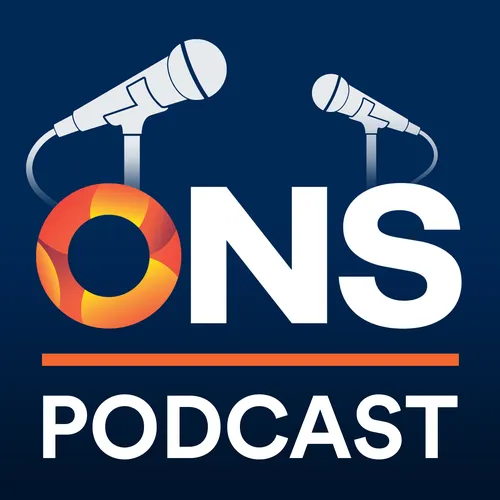
The ONS Podcast
Where ONS Voices Talk Cancer
Join oncology nurses on the Oncology Nursing Society's award-winning podcast as they sit down to discuss the topics important to nursing practice and treating patients with cancer.
ISSN 2998-2308
- Update frequency
- every 7 days
- Average duration
- 34 minutes
- Episodes
- 383
- Years Active
- 2017 - 2025

Episode 300: AYAs With Cancer: End-of-Life Care Planning
“Trying to give them as much autonomy as possible is really important. I always like to ask, ‘Would you like to have a conversation? Do you think that you can handle a conversation about advance care…

Episode 299: Pharmacology 101: Plant Alkaloids
“I can't stress enough how often I get questions about, ‘Is this the paclitaxel doing this? Is this the docetaxel doing this?’ And coming up with strategies to kind of help get our patients through w…

Episode 298: Radiation Oncology: Nursing’s Essential Roles
“We are there for whatever issue, whether it's skin management or helping just cheer them on and manage small things or big things, you know, to get them through these treatments. And then as a patie…

Episode 297: Intra-Arterial Chemotherapy Administration: The Oncology Nurse’s Role

Episode 296: Pharmacology 101: Anthracyclines and Other Antitumor Antibiotics
“The search for daunorubicin’s sister really led to this discovery of doxorubicin, which is an analog with much greater activity. The discovery of doxorubicin can be coined kind of as, ‘one of the be…

Episode 295: Cancer Symptom Management Basics: Pulmonary Embolism, Pneumonitis, and Pleural Effusion
“So much of this is just knowing what is their diagnosis, what medications are they on, what could be the root cause of this—where is their disease to begin with? There's really a lot of differentia…

Episode 294: AYAs With Cancer: Clinical Trial Enrollment Barriers and Facilitators
“AYAs are underrepresented in clinical trials and unfortunately have one of the highest rates of being uninsured of any population. So, this is really concerning for a lot of reasons and really impac…

Episode 293: Access to Care: How to Manage Moral Dilemmas and Advocate for Your Patients
“I can think of examples where I have two patients. They have the same diagnosis, but they have two different insurance companies, treatment plan’s the same. ‘Patient A’ isn't going to get the optima…

Episode 292: What We Need to Do to Retain Today’s Oncology Nursing Workforce
“With the turnover rates where they’re at now, there’s no way we can keep thinking how we did in the past—like, we have to. There’s no doubt. We have to think differently,” Deborah Cline, DNP, RN, as…

Episode 291: Build a Sense of Belonging for Nurses and Patients
“A sense of belonging is what tethers us to those who share in our spaces that work with us. Belonging is fueled by a social connection, which is one of our basic human needs. When you feel safe, sup…

Episode 290: Cancer Symptom Management Basics: Peripheral Neuropathy
“I think educating patients of what can happen and those are the symptoms you're really looking for to decrease this from getting to the severe level is like the sensory stuff. It's kind of your star…

Episode 289: 2023 Health Policy Wrap-Up and Outlook for 2024
“Our top priorities really revolve around ensuring that everybody, regardless of their income, regardless of their gender, regardless of their race, regardless of where in the country they live, has …

Episode 288: Pharmacology 101: Antimetabolites
“I think that there are certain agents that are so foundational in some diseases that they will remain. Whether they remain first-line, maybe not; maybe they’ll go to second line as we see things evo…

Episode 287: Tools, Techniques, and Real-World Examples for Difficult Conversations in Cancer Care
“I think the key in effective communication is building trust, because without trust, patients are not likely to engage in their care as effectively, which can influence patient well-being and their …

Episode 286: Pharmacology 101: Alkylating Agents
“When I meet with patients, I try and remind them, ‘Yes, you do have these side effects that can happen’ and make sure that they’re informed, but also try and reassure them that not everyone gets it …

Episode 285: Transarterial Chemoembolization: The Oncology Nurse’s Role
“I think oftentimes people think this is just a radiology procedure that is rather benign. That’s really the role of the oncology nurse, just to be [an educator], support, emotional support, and a co…

Episode 284: How AI Is Influencing Cancer Care and Oncology Nursing
“We incorporate nurses and clinicians and users for any tool from the very beginning. They say, ‘You know, we need help with this.’ And then we start ideation: We start understanding the problem, we …

Episode 283: Desensitization Strategies to Reintroduce Treatment After an Infusion-Related Reaction
“Having a nurse-driven protocol, at my facility we call them clinical practice guidelines, allows for that immediate action and swift intervention for the patient,” Maura Price, MSN, RN, AOCNS®, onco…

Episode 282: Telehealth-Based Oncology Palliative Care
“We really need to do our best to reach people who don’t have access to palliative care in their communities, and this is an innovative way for us to do that,” Carey Ramirez, ANP-C, ACHPN, nurse prac…

Episode 281: Nursing’s Role in AI in Health Care
“I think the horizon, the trends that we are seeing today, are indicating that this technology is just going to explode and be integrated into everything we do in nursing or beyond. Many of the thing…